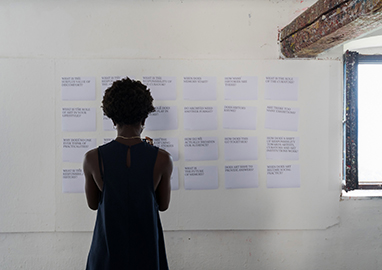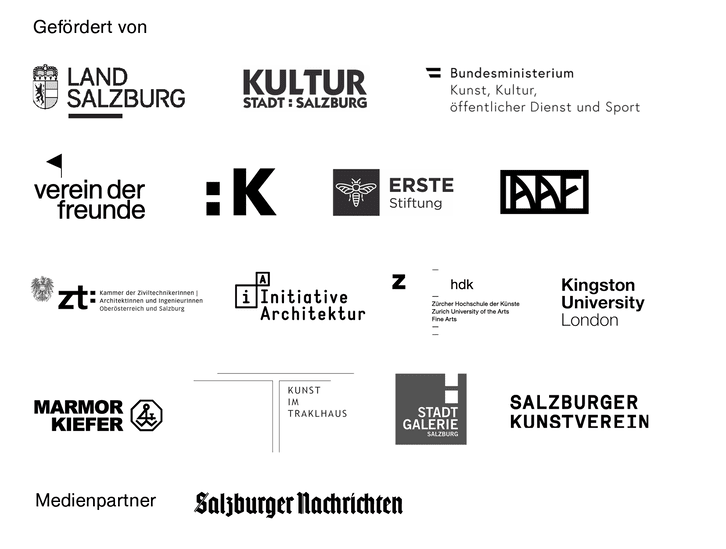| Shop |
- Academy
- Studies
- Courses
- – Courses 2024
- – All courses
- – Painting
- – Drawing
- – Printmaking
- – Photography / Film / Video
- – Sculpture
- – Installation
- – Performance
- – Architecture
- – Art Critique / Writing
- – Curating
- – Course archive 2023
- – Course archive 2022
- – Course archive 2021
- – Course archive 2020
- – Course archive 2019
- – Course archive 2018
- – Courses until 2017
- Events
- Blog/Videos
- Press

Nicolaus Schafhausen
The present and disharmony

Open Day 2019, course Nicolaus Schafhausen, in the picture: Olamiju Fajemisin, photo: Mira Turba
Media
Curatorial theory and practice
Location
Hohensalzburg Fortress and Online
Teaching language
English (teacher also speaks German)
What to bring
Interest in a critical examination of contemporary art and curatorial practices
Requirements
None
Maximum number of participants
8 on site, 7 online
Co-teacher
Nils Emmerichs
Participation fee
€ 460.– (€ 380.–); online € 350.– (€ 300.–)
It has become a fixed narrative in cultural life, that we have to act politically.
It is interesting that this leaves a wide cross-section of our society unimpressed – which has become not only a socio-political but also an aesthetic problem. Is art even appropriate for political debates? Does art have to be scientifically or academically correct? What allegedly political art asserts is often not political reality, but fiction. We know this. Does art have to be moral today? Does everything have to be possible in art – is this still a valid category?
Do artists have any influence on world politics, and if so, what? When artists engage in political debate, do they not lose their alleged autonomy? In what moral categories must we as curators judge art production, when artists comment on world politics? Is it permissible for art to be in disharmony with reality?
For decades, contemporary art institutions claim art to be a "protected area". In my experience, we still find ourselves in an institutional discourse, arguing on the level of the 1990s. There are no longer any protected areas; it is a question of implementing far-reaching ideas.
Curators should not fall into the error of thinking that publications and exhibitions – which to some extent reflect our mental approaches – are the issues to be considered relevant by an abstract public. So should we observe more attentively society per se, embracing and learning from its historical narrative?
The basis of the social, political and aesthetic questions in the course is: how can we establish a model that ensures the essential achievement "freedom of art" now and in the future? We aim to develop intervention strategies and forms of communication which do not lead to the false belief that better arguments can bring about change, but which show that practice itself must change. For at present, we do not have the institutions (and perhaps not even the skills) that can represent the problems of the present day.
Besides the above-mentioned questions, the course will ask:
- Is it permissible to exhibit politically controversial art?
- Is there an iconography of memory?
- What could restructuring of work in the intellectual/artistic professions look like?
- What will be the function of curating in the coming years?
- Is the contemporary art world constantly producing new forms of forgetting?
Curatorial theory and practice
Location
Hohensalzburg Fortress and Online
Teaching language
English (teacher also speaks German)
What to bring
Interest in a critical examination of contemporary art and curatorial practices
Requirements
None
Maximum number of participants
8 on site, 7 online
Co-teacher
Nils Emmerichs
Participation fee
€ 460.– (€ 380.–); online € 350.– (€ 300.–)
It has become a fixed narrative in cultural life, that we have to act politically.
It is interesting that this leaves a wide cross-section of our society unimpressed – which has become not only a socio-political but also an aesthetic problem. Is art even appropriate for political debates? Does art have to be scientifically or academically correct? What allegedly political art asserts is often not political reality, but fiction. We know this. Does art have to be moral today? Does everything have to be possible in art – is this still a valid category?
Do artists have any influence on world politics, and if so, what? When artists engage in political debate, do they not lose their alleged autonomy? In what moral categories must we as curators judge art production, when artists comment on world politics? Is it permissible for art to be in disharmony with reality?
For decades, contemporary art institutions claim art to be a "protected area". In my experience, we still find ourselves in an institutional discourse, arguing on the level of the 1990s. There are no longer any protected areas; it is a question of implementing far-reaching ideas.
Curators should not fall into the error of thinking that publications and exhibitions – which to some extent reflect our mental approaches – are the issues to be considered relevant by an abstract public. So should we observe more attentively society per se, embracing and learning from its historical narrative?
The basis of the social, political and aesthetic questions in the course is: how can we establish a model that ensures the essential achievement "freedom of art" now and in the future? We aim to develop intervention strategies and forms of communication which do not lead to the false belief that better arguments can bring about change, but which show that practice itself must change. For at present, we do not have the institutions (and perhaps not even the skills) that can represent the problems of the present day.
Besides the above-mentioned questions, the course will ask:
- Is it permissible to exhibit politically controversial art?
- Is there an iconography of memory?
- What could restructuring of work in the intellectual/artistic professions look like?
- What will be the function of curating in the coming years?
- Is the contemporary art world constantly producing new forms of forgetting?
Nicolaus Schafhausen is a German-born curator, director, author, and editor of numerous publications on contemporary art. Since 2011 he has been the Strategic Director of Fogo Island Arts, Canada, an initiative of Shorefast, a charitable foundation dedicated to finding alternative solutions for the revitalisation of areas prone to emigration.
Schafhausen is the Artistic Director of Tell me about yesterday tomorrow (November 2019 - August 2020), an exhibition at the Munich Documentation Centre for the History of National Socialism about the future of the past. He has curated numerous international exhibitions such as Media City Seoul 2010 and the Dutch Pavilion at the Shanghai World Expo 2010. He was the curator of the German Pavilion for the 52nd (2007) and 53rd Venice Biennale (2009), and curator of the Kosovo Pavilion for the 56th Venice Biennale (2015). Schafhausen also co-curated the 6th Moscow Biennale in 2015.
In addition to curating exhibitions, national pavilions and other projects, Schafhausen has led institutions such as the Frankfurt Kunstverein (DE), Stuttgart Künstlerhaus (DE), and Witte de With Center for Contemporary Art in Rotterdam (NL). He was Founding Director of the European Kunsthalle, Cologne (DE), conceived as a project to examine the conditions and structures of contemporary art institutions independent of local government mandates. In 2019 he stepped down as Director of the Kunsthalle Wien/Vienna, a position he had held since 2012, for political reasons, observing that the future of such cultural institutions was thrown into question by rising nationalist policies in Austria and elsewhere. He has called for stronger support from independent state institutions and cultural administrations in times of right-wing populist movements. In the future Schafhausen aims to work beyond the boundaries of conventional institutions.
Exhibitions
2019 Tell me about yesterday tomorrow, NS-Dokumentationszentrum München, Munich (DE). 2018 Antarktika. Eine Ausstellung über Entfremdung, Kunsthalle Wien, Vienna. 2017 Thomas Bayrle. Wenn etwas zu lang ist – mach es länger, Museum of Applied Arts, Vienna. How To Live Together, Kunsthalle Wien, Vienna. 2015 Politischer Populismus, Kunsthalle Wien, Vienna. How To Gather? Acting in a Center in a City in the Heart of the Island of Eurasia?, (co-curated with Bart De Baere and Defne Ayas) 6th Moscow Biennial, Moscow. 2014 Disappearing Things, (co-curated with Vanessa Joan Müller) 55th October Salon, Belgrade.
Publications
Brigitte Oetker, Nicolaus Schafhausen (eds.): Was wissen wir? Was haben wir? Was fehlt uns? Was lieben wir?. Jahresring 65, Sternberg Press, Berlin 2018.
Alexandra McIntosh, Nicolaus Schafhausen (eds.): Edgar Leciejewski: Tones, Fogo Island Arts/Sternberg Press, Berlin 2018.
Defne Ayas, Bart De Baere, Marie Egger, Nicolaus Schafhausen (eds.): How To Gather. Acting Relations, Mapping Positions, Witte de With Centre for Contemporary Art, Rotterdam 2017.
Luca Lo Pinto, Nicolaus Schafhausen (eds.): Pierre Bismuth. Things I Remember I Have Done, But Don’t Remember Why I Did Them, Sternberg Press, Berlin 2016.
Nicolaus Schafhausen: Isa Genzken, Oil: German Pavilion, Biennale di Venezia 2007, DuMont-Literatur-und-Kunst-Verlag, Cologne 2007.
Schafhausen is the Artistic Director of Tell me about yesterday tomorrow (November 2019 - August 2020), an exhibition at the Munich Documentation Centre for the History of National Socialism about the future of the past. He has curated numerous international exhibitions such as Media City Seoul 2010 and the Dutch Pavilion at the Shanghai World Expo 2010. He was the curator of the German Pavilion for the 52nd (2007) and 53rd Venice Biennale (2009), and curator of the Kosovo Pavilion for the 56th Venice Biennale (2015). Schafhausen also co-curated the 6th Moscow Biennale in 2015.
In addition to curating exhibitions, national pavilions and other projects, Schafhausen has led institutions such as the Frankfurt Kunstverein (DE), Stuttgart Künstlerhaus (DE), and Witte de With Center for Contemporary Art in Rotterdam (NL). He was Founding Director of the European Kunsthalle, Cologne (DE), conceived as a project to examine the conditions and structures of contemporary art institutions independent of local government mandates. In 2019 he stepped down as Director of the Kunsthalle Wien/Vienna, a position he had held since 2012, for political reasons, observing that the future of such cultural institutions was thrown into question by rising nationalist policies in Austria and elsewhere. He has called for stronger support from independent state institutions and cultural administrations in times of right-wing populist movements. In the future Schafhausen aims to work beyond the boundaries of conventional institutions.
Exhibitions
2019 Tell me about yesterday tomorrow, NS-Dokumentationszentrum München, Munich (DE). 2018 Antarktika. Eine Ausstellung über Entfremdung, Kunsthalle Wien, Vienna. 2017 Thomas Bayrle. Wenn etwas zu lang ist – mach es länger, Museum of Applied Arts, Vienna. How To Live Together, Kunsthalle Wien, Vienna. 2015 Politischer Populismus, Kunsthalle Wien, Vienna. How To Gather? Acting in a Center in a City in the Heart of the Island of Eurasia?, (co-curated with Bart De Baere and Defne Ayas) 6th Moscow Biennial, Moscow. 2014 Disappearing Things, (co-curated with Vanessa Joan Müller) 55th October Salon, Belgrade.
Publications
Brigitte Oetker, Nicolaus Schafhausen (eds.): Was wissen wir? Was haben wir? Was fehlt uns? Was lieben wir?. Jahresring 65, Sternberg Press, Berlin 2018.
Alexandra McIntosh, Nicolaus Schafhausen (eds.): Edgar Leciejewski: Tones, Fogo Island Arts/Sternberg Press, Berlin 2018.
Defne Ayas, Bart De Baere, Marie Egger, Nicolaus Schafhausen (eds.): How To Gather. Acting Relations, Mapping Positions, Witte de With Centre for Contemporary Art, Rotterdam 2017.
Luca Lo Pinto, Nicolaus Schafhausen (eds.): Pierre Bismuth. Things I Remember I Have Done, But Don’t Remember Why I Did Them, Sternberg Press, Berlin 2016.
Nicolaus Schafhausen: Isa Genzken, Oil: German Pavilion, Biennale di Venezia 2007, DuMont-Literatur-und-Kunst-Verlag, Cologne 2007.

Portrait photo: Steffen Jagenburg
Internationale
Sommerakademie
für bildende Kunst
Salzburg
Kontakt
Postfach 527, 5010 Salzburg, Österreich
T +43 662 842113
T +43 662 842113
| Folgen Sie uns: Newsletter TikTok YouTube |
| © 2023 / Impressum / Datenschutz |
